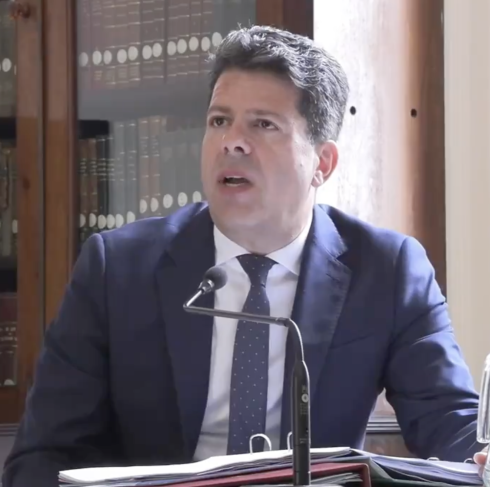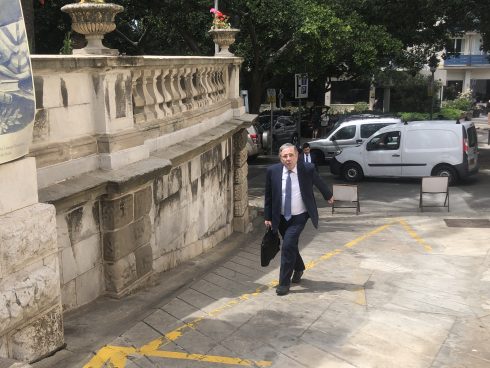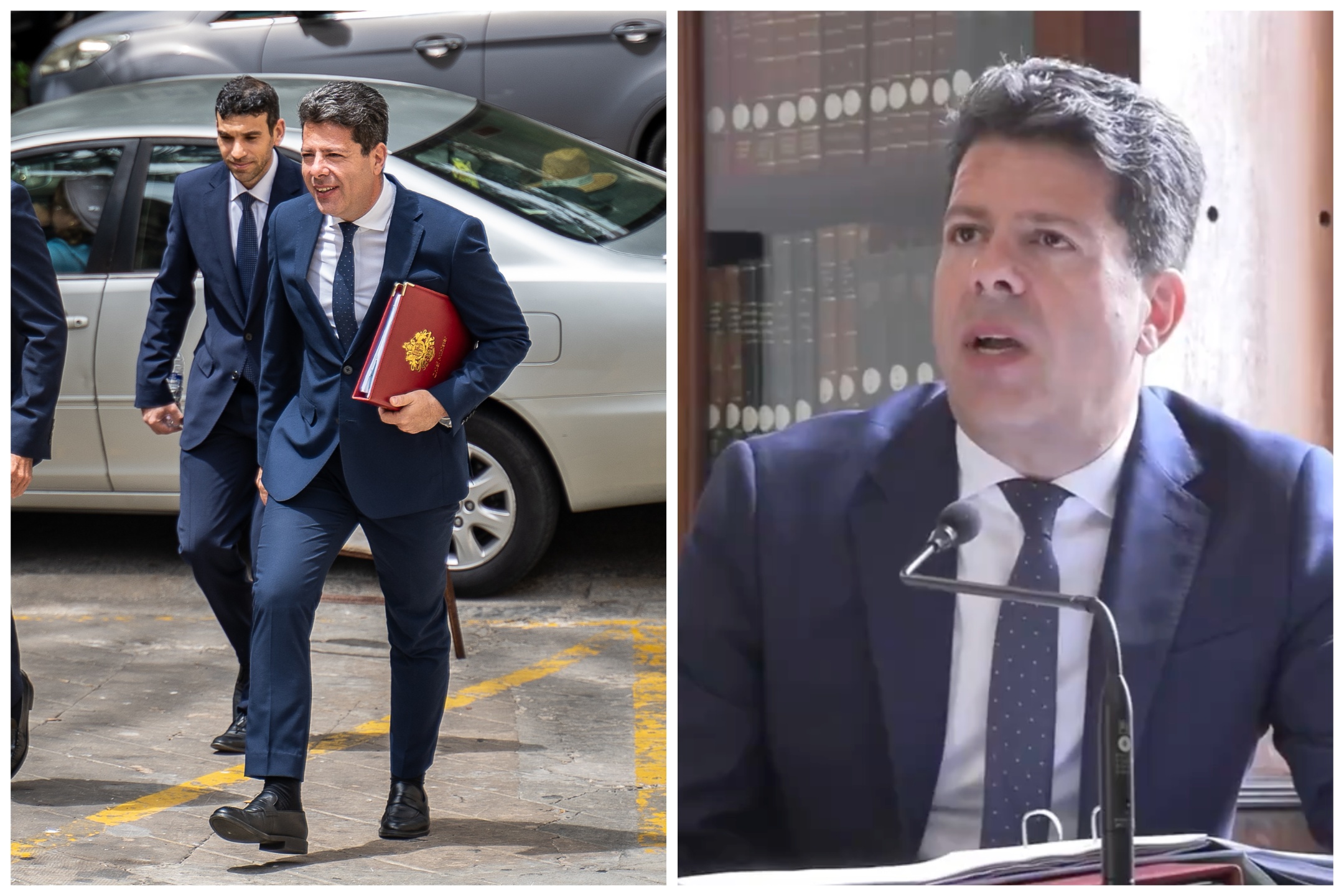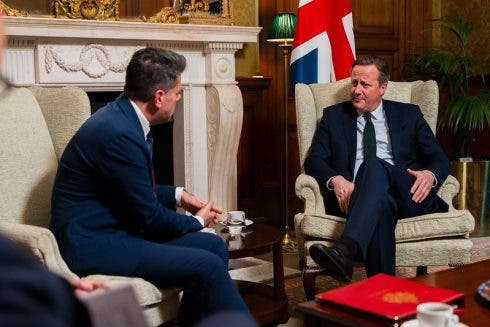THE Chief Minister told the McGrail inquiry that a ‘guileless’ search warrant against Gibraltar’s ‘biggest rain maker’ could have led to ‘serious reputational damage’ for the jurisdiction.
Fabian Picardo described Hassans senior partner James Levy KC as one of the Rock’s ‘biggest sources of business’, alluding to how he ‘makes it rain [money]’ by bringing in many ‘high net worth’ clients to the economy.
Throughout its inquiries, the hearings have continuously circled back to a search warrant the Royal Gibraltar Police attempted to execute against Levy on May 12, 2020.
It meant that all the privileged information of the King’s Counsel’s wealthy clients – who are so important to the economic lifeblood of Gibraltar – was suddenly at risk when officers confiscated his electronic devices.

This would not have been the case if the police had used the less invasive production order, according to the Chief Minister.
“Seeking to obtain evidence from Mr Levy could have happened in a way that did not expose the jurisdiction to reputational risk in the way it did,” Picardo told the inquiry as it began its sixth week.
“Those who are protected by a production order are his clients, not Mr Levy.
“Who is to say that the RGP would not have gone into the private chats of individuals who have expectations of privacy when dealing with a top lawyer in Gibraltar?
“There’s a report that says the RGP routinely use their own personal phones to interrogate devices they have confiscated under search warrants.
“That means they keep that information on their own devices going forward.”
While Picardo insisted that ‘Gibraltar is governed by the rule of law entirely’ and ‘no one is above the law’, he also admitted that there are ‘some circumstances where it requires more guile and temperament than shown by the RGP.’

The inquiry is trying to get to the bottom of the circumstances surrounding the early retirement of former Commissioner of Police Ian McGrail in June 2020 amid allegations the government acted inappropriately to force him out.
Not only was Levy critical to the financial success of Gibraltar, but Picardo also described him as an ‘angel investor’ who had helped many businesses with cash injections both large and small.
It was in this role that Levy put £476,000 (€560,000) of Hassans money into a company in 2018 that was trying to wrestle away the contract for the computer system that monitored Gibraltar’s border with Spain.
Police launched an investigation into the issue after Blands Ltd, the original owners of the NSCIS (National Security Centralised Intelligence System), complained that employees of 36 North Ltd had ‘hacked and sabotaged’ it.
The transfer would have many advantages for Picardo as it would resolve a festering ownership issue and it would work out cheaper for the government on an annual basis.
There could also be lucrative opportunities to licence the NSCIS software to governments abroad – especially in Africa, as was heard during Levy’s testimony in the second week of the inquiry.
However, along with all these benefits, it would also benefit Picardo personally, by virtue of the Chief Minister being a partner on sabbatical at Hassans.
READ MORE: Spain and the UK agree ‘general political lines’ on post-Brexit deal over Gibraltar

It meant he would have owned 3% of 36 North.
This led to accusations that he had been motivated to ‘interfere’ into the search warrant against Levy in order to protect his investment.
However, the Chief Minister put this to bed by explaining that he had decided to keep the government contract with Blands and not transfer it to 36 North in 2018, two years before the search warrant on Levy.
“The investment in 36 North had already been resolved against my own financial interest,” he explained.
“By making the decision that the contract would stay with Blands and not go to the entity in which I had a final interest, it demonstrates that I acted selflessly and in the interest of the people of Gibraltar and not in my own interests in any way.”
Under the fierce glare of McGrail sitting just metres away, Picardo explained that his efforts to have the Commissioner of Police removed was not motivated by impropriety but by ‘the disgraceful way police had abused their powers in seeking a search warrant [against Levy].’
“I was lied to by the most senior law enforcement official in Gibraltar, to my face, in my office,” he declared, referring to the dispute over whether the Director of Public Prosecutions had approved the search warrant.
“I think they were relying on the flimsiest of flimsy pretences in order to obtain search warrant over production order,” he said.
Shockingly, Chief Minister freely admitted that he was the one who had informed Hassans that the DPP had supposedly ‘strongly advised’ against using a search warrant – in issue later disputed in itself.

When asked if he felt assisting a potential suspect in a criminal investigation against the police was in conflict with his roles as Chief Minister, he dismissed it as a ‘tension’ rather than a ‘conflict of interest.’
The inquiry has long been trying to deduce who had shared with Hassans that the Director of Public Prosecutors had supposedly advised the RGP not to pursue a search warrant against Levy.
“Could it be said that [this information] was shared with you for one purpose, and you shared it [with Hassans] for another purpose?” Julian Santos, counsel to the inquiry, asked.
“It was shared with me for one purpose, I shared it for that same purpose, but it might have had other consequences,” Picardo replied.
“I was not passing it onto Hassans. I was saying it to all and sundry – about how improper the [search warrant] process had been but in particular about how I had been lied to by Ian McGrail.”
During a long day of questions the Chief Minister insisted that he had complied with the Ministerial Code ‘at every stage’ but admitted that he was ‘always open to guidance and learning’ on these issues.
“I don’t pretend to be perfect. I genuinely believe I’ve acted properly at all times and, finally, I fall back on the fact that I made the decision that the contract should not go to the entity in which I have a minor financial interest.
“That’s why I can say I discharged the burden of complying with the code.”











